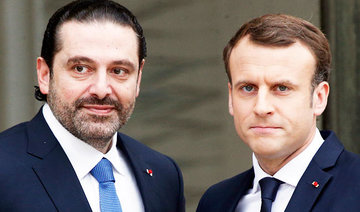BEIRUT: Lebanon hopes to secure billions of dollars for infrastructure this week at an international donor conference in Paris, as it grapples with low growth and soaring debt.
Some 50 countries and international organizations are expected at the CEDRE (Cedar) conference that begins Friday, where Beirut will request up to $22 billion for an eight to 12 year investment program. Lebanon hopes an influx of cash will help revive the economy, which has been hammered by political unrest and spillover from the war in neighboring Syria.
Lebanon is home to some 1.2 million refugees, accounting for nearly a quarter of its population. The civil war next door has also hindered land exports to Jordan, Iraq and oil-rich Gulf nations.
From 2007 until 2010, Lebanon’s economy grew at an average of 9 percent annually. But it hit a major downturn in 2011, when a political crisis brought down the government and the Syrian uprising stoked unrest among Lebanese factions.
Since then, growth has averaged a mere 1.5 percent, according to government estimates, and rampant corruption has hollowed out infrastructure and basic services. Nearly three decades after the end of the 1975-1990 civil war, Lebanon still experiences frequent cutoffs of water and electricity. With public transport networks virtually non-existent, its aging roads are clogged with traffic. Chronic problems with waste management have sparked mass protests in recent years.
“Lebanon currently is facing major economic challenges, and these challenges range from budgetary problems to balance of payment to growth to unemployment,” said Nadim Munla, senior adviser to Prime Minister Saad Hariri.
“It has been characterized by many as a very difficult time,” with some calling it a “doomsday scenario,” he said.
Munla said the conference will be seen as a major success if Beirut can secure funding for the first stage of its investment plans, an estimated $10 billion. He says the private sector can supply another $4 billion for the projects, which are aimed at revitalizing water, electricity, telecom and waste services.
But critics fear the remainder of the financing will come from borrowing, exacerbating an already severe debt burden.
Fears of economic collapse have mounted ahead of the first parliamentary elections in nine years, scheduled for May 6. Many worry that the Lebanese currency, which has been pegged at 1,500 to the dollar since 1997, could be devalued. Central Bank governor Riad Salameh has repeatedly dismissed those fears, saying the bank has assets worth $43.2 billion in addition to more than $11.5 billion worth of gold.
The state-owned electricity company is considered one of the biggest drains on the state budget, costing about $1.5 billion a year, depending on international oil prices. Tariffs have not gone up since 1996, even though many Lebanese say they would happily pay more if they could get 24-hour power instead of relying on costly neighborhood generators.
Hazar Caracalla, another adviser to the prime minister, said the Cabinet is committed to opening both electricity and telecoms to the private sector in hopes of improving services, and has already approved a framework for addressing the garbage crisis.
Lebanon's financial crisis
- There are increasing fears that the Lebanese currency could be devalued
- At a cost of $1.5 billion a year the country’s electricity company is considered one of the biggest drains on the national budget
- Nadim Munla, senior advisor to Prime Minister Saad Hariri says the conference in Paris will be a major success if they can secure funding for the first stage of its investment plans, but many fear the remainder will come from borrowing
Last week, Lebanon’s parliament approved a budget — its second since 2005 — with a fiscal deficit of $4.8 billion. The national debt at the end of 2017 stood at $80 billion, or more than 150 percent of gross domestic product.
The militant Hezbollah group, which is part of the coalition government, has expressed concerns that the conference will add to the already massive debt. Other critics have suggested the conference, which is organized by France, is aimed at boosting Hariri’s pro-Western allies ahead of next month’s vote.
Munla hit back at critics, saying: “If they have an alternative, put it on the table and let’s discuss it.”
Nassib Ghobril, the chief economist at Bank Byblos, Lebanon’s third largest lender, said the international community is eager to support Lebanon’s stability, but will expect the government to implement urgently-needed reforms.
“The upgrade of infrastructure will help improve the competitiveness of the economy, but that’s not going to be enough without implementing structural reforms that would improve the investment climate and the business environment,” Ghobril said.


























